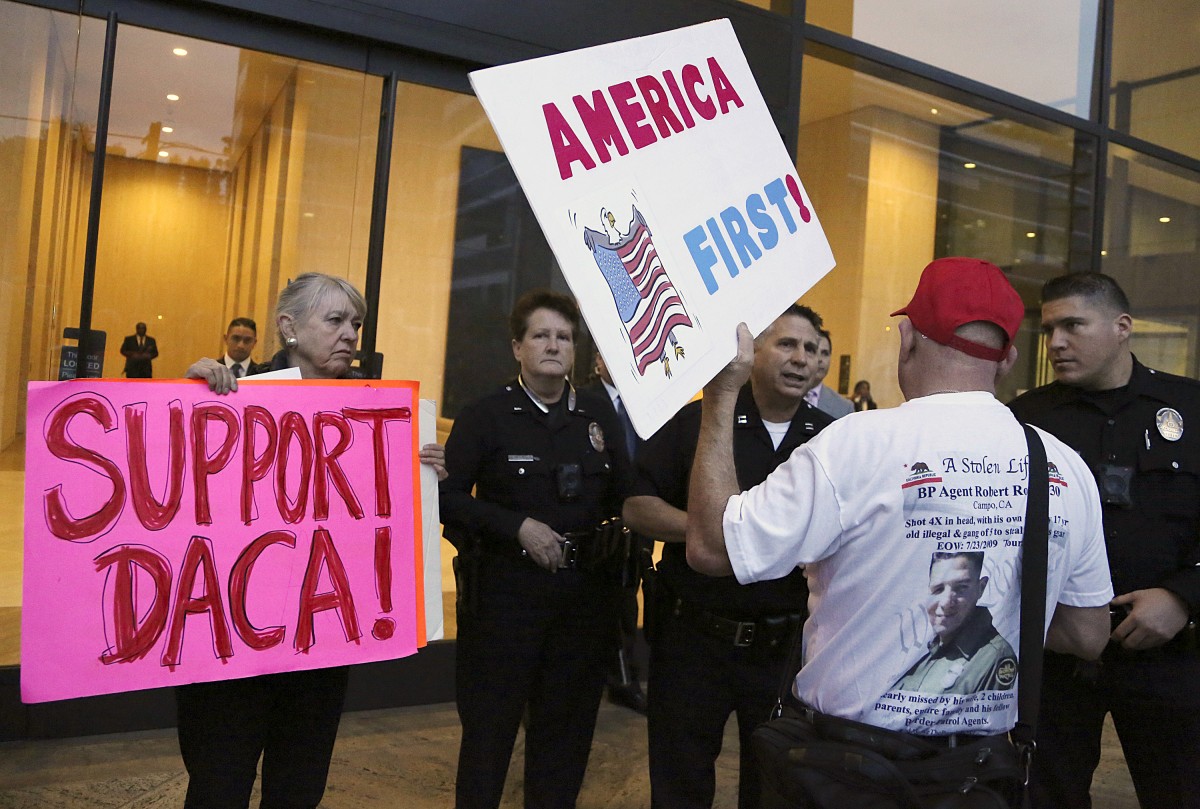“We are transferring power from Washington, D.C. and giving it back to you, the American people,” President Trump said one year ago during his inaugural address. He continued; “A new national pride will stir our souls, lift our sights, and heal our divisions.”
While this new national pride stirred much more than just souls, America’s divides only deepened in 2017.
The past year demonstrated a significant uptick in outspoken nativism and nationalism across America, with much of the movement’s most visible expression located in the rural parts of the country.

This surge of activism and involvement is the common denominator across a spectrum of ideological conflict. “Antifa,” a decentralized coalition of far-left activists, acts as an unofficial security force, protecting marches under the banner of resistance against Trump’s administration or, like in Philadelphia in July 2017, disrupting pro-Trump rallies. Meanwhile, individuals like Richard Spencer and Matthew Heimbach, prominent activists of the alt-right and white supremacy movements, agitate for their cause on college campuses.

Photo by Jan Pytalski
According to the Southern Poverty Law Center (SPLC), there are 917 hate groups currently operating within the United States. 40 percent (367) of America’s hate groups reside in Appalachia alone. Within that group, 43 were identified as White Nationalist and 33 as Neo-Nazi. Between 2014 and 2016, the SPLC noted the emergence of 133 new hate groups across the USA.
The administration’s previously ambiguous and delayed responses to increased public acts of violence and hate speech may encourage radicals. It took two full days for Trump to condemn racist and alt-right groups taking part in the tragic events in Charlottesville, when the president delivered his now infamous remarks at the Trump Tower, in which he tried to equally divide the blame between “both sides” of the rally. David Duke, a former Ku Klux Klan Grand Wizard, thanked the President for his comments in a tweet.
But it’s important to remember that these phenomena have older siblings in Europe. Was the wave of nativism sweeping America born out of political quakes across the Atlantic?
Łukasz Pawłowski, a sociologist and a psychologist affiliated with Liberal Culture, a Warsaw-based, centrist media organization, pointed out in an email exchange that while motivations of the radical right may vary across the globe, it is the shift in America’s political leadership’s responses that is the most damaging.
Political fringes of all breeds hold their rallies across the globe, but it used to be understood that political leaders of all sides would condemn their acts of violence and blatant hate speech. Former Presidents George H.W. Bush and George W. Bush, Bill Clinton and Barack Obama all condemned events of Charlottesville in no uncertain or ambiguous terms. In Europe, German Chancellor, Angela Merkel, and her government repeatedly denounced neo-Nazis and white extremists who targeted asylum seeking refugees.
Here’s what Steffen Seibert, a Chancellor’s press secretary, had to say about violent protests against refugees in 2015: “It is disgusting how right-wing extremists and neo-Nazis attempt to spread their idiotic message of hatred around an asylum shelter.”
Recently, the British Prime Minister, Theresa May, openly criticized Donald Trump for retweeting hateful anti-Muslim videos. Her spokesperson stated that “British people overwhelmingly reject the prejudiced rhetoric of the far right which is the antithesis of the values that this country represents — decency, tolerance and respect.”
In November, Poland celebrated the anniversary of its independence. For the past several years, it has become a day of social unrest. American news outlets like the Washington Post and Wall Street Journal described the country as consumed in increasingly nationalistic and often overtly racist marches and manifestations.
Dan Rather’s site News and Guts posted a story that rang the alarm bells for an American audience:
“Please pay attention to Poland! … Yesterday 60,000 protesters jammed the streets of Warsaw chanting for a ‘white Europe’ or more frighteningly, an ‘Islamic holocaust.’ 60,000 white nationalists, Neo-Nazis and the like from Poland and all over Europe who want refugees out and their old way of life back. Sound familiar?”
Yet what American press tends to present as shocking has become a regular occurrence in many EU states. The events of November 11 in Poland, while unnerving to many and still fairly marginal, are not surprising. Nor are they isolated. The Golden Dawn in Greece, Jobbik in Hungary, the National Front in France or UKIP in the Great Britain are all part of the mosaic that can help provide context for a year of rising nationalism in the United States.
According to Pawłowski, assimilating and allowing the discourse of the extreme right might backfire. In the case of Poland, these radical movements have no actual political representation. With only few exceptions, most of the countries witnessing the resurgence of those sentiments see no, or relatively little, of that representation as well.
So far, that’s also true for the United States. With the recent ousting of Steve Bannon and Sebastian Gorka from the White House, most of the openly nationalistic figures in the Administration are out. But it didn’t stop Trump from adopting some of the language of the fringe that Bannon or Gorka represented. And still others who perpetuate its continuity, like Stephen Miller and Kellyanne Conway, remain inside the West Wing.
And yet, the most recent falling out with Bannon suggests that the President treats those in his circle more as toolboxes than ideological allies. After Bannon’s harsh critique of Trump’s family from the upcoming book “Fire and Fury” by Michael Wolff became public, the President reacted by releasing a statement in which he said that “When he (Bannon) was fired, he not only lost his job, he lost his mind,” and the White House denounced them as fiction.
What caught my attention, however, was the very last paragraph of the presidential statement: “We have many great Republican members of Congress and candidates who are very supportive of the Make America Great Again agenda. Like me, they love the United States of America and are helping to finally take our country back and build it up, rather than simply seeking to burn it all down.” But wasn’t that the whole point? To drain the swamp and to burn the old world down? The tune changed quickly, exposing the Administration’s fling with the alt-right as perhaps recklessly pragmatic rather than ideologically passionate.
But then the White House introduced another twist to the story on Thursday, January 11. While discussing a much-needed immigration reform with the leaders of both parties, Donald Trump posed the question “Why are we having all these people from shithole countries coming here?” His comments were directed at men and women from African countries, Haiti and El Salvador. He later suggested that the United States should accept more people from countries like Norway.
As outrageous and despicable as these comments may be, it’s the echo-chamber effect that’s truly terrifying. Expected outcry and criticism of Trump’s remarks weren’t enough to discourage voices on the right (and far right) from defending, and endorsing, his message. Here’s just a sample of what Richard Spencer had to say about Haiti and its people. The famous TV anchor, Tucker Carlson, defended Trump’s language during his show on FOX News, claiming that the President is merely describing a reality, whether economic, political or both, of those countries. He too tweeted his insights. In a stroke of twisted logic, he identified protections granted by the U.S. to El Salvadorians as the proof of their country being a proverbial “shithole.”
Chauvinism, in every sense of the word, pervades cable TV.
The similarities between the populist tactics that — intentionally or unintentionally — fuel radical movements are staggering. Here’s Pawłowski again, for the Financial Times:
The ruling Law and Justice party, or PiS, won the October 2015 elections not just because of its radicalism but because it succeeded in telling different stories to different parts of the electorate: economic growth for free marketers; assurances to trade unionists; and more generous policies for families. What brought these disparate strands together was the promise to “put Poland first” and pursue the country’s interests on the international stage in a more assertive manner. The slogan, “Rising from our knees,” was employed to describe the party’s foreign policy agenda, with PiS unequivocally opposed to admitting any refugees under the EU’s relocation scheme.
One of the Brexit’s main proponents, UKIP’s Nigel Farage, remains a loyal Trump supporter and a good friend. Trump, in turn, supported the Brexit campaign.
Fringe voices became magnified by their sudden access to the national platforms like the presidential podium (or Twitter) and the likes of Bannon and his political machine. Participation numbers may fluctuate, spike then flatline, but, as Pawłowski noted, it is the unwillingness to denounce the radical right that speaks volumes — and the subsequent devolution of public discourse may prove difficult to reverse.
It didn’t take long for one of the most notorious alt-right, neo-Nazi and white supremacist websites, the Daily Stormer, to announce proudly that the President of the United States is, basically, “on the same page” as them when it comes to immigration. The same article that celebrates President’s “refreshing” approach to the issue concludes with the following statement: “The real issue is all of these shitty brown people who come to the country exclusively to parasite off of us.”
Speaking in a manner that leaves a standing invitation for all the ideological outliers might result in some actually showing up on your doorstep.



